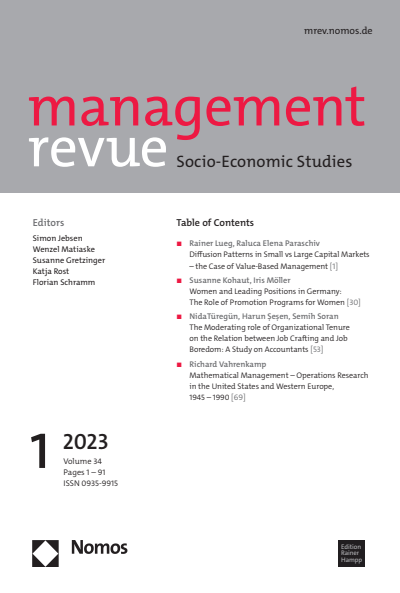Consumer Responsibility and the Transformation Process of the Electricity Market: Insights From Behavioral Decision ResearchDate submitted: October 27, 2017Revised version accepted after double blind review: November 11, 2018
IF 1.7
0 MANAGEMENT
引用次数: 1
Abstract
Since the 1990s, consumer research has looked for causes that could explain the absence of switching behavior of electricity consumers in liberalized electricity markets. Recent decision theory findings suggest that this absence of switching behavior is due to the so-called status quo bias. The status quo bias reflects the tendency of individuals to prefer the actual situation disproportionately (Samuelson & Zeckhauser, 1988). Using the insights of this particular bias, an economic experiment was designed to empirically test the influence of the status quo bias. In a choice-based conjoint analysis, subjects were repeatedly offered different variations of electricity contracts. 300 subjects were randomly assigned to either the control or the experimental group in four different treatments. In each of a total 15 decision-making situations, one electricity contract had to be chosen from the five different electricity contracts available. The only variation between the control and the experimental groups was that, in each decision situation of the three different status quo treatments, always one of the five electricity contracts was preselected by default. In accordance with a specific decision-making rule, this was always either the most renewable, the most local or the most expensive electricity contract. The results show significant differences between the control and the experimental group with respect to the part-worth utilities and the relative importance of the attributes. In contrast to the expectations of the model of rational choice, the type of framing of the choice task, whether an electricity contract was preselected by default as a status quo or not, seemed to influence the decision behavior of the subjects. The results are criticized as to whether competition in the liberalized electricity market is a suitable instrument to promote climate and infrastructure projects in the long term by the individual choice of electricity consumers, or whether political measures that are brought about by a collective decision should be preferred.消费者责任与电力市场转型过程:来自行为决策研究的洞察交稿日期:2017年10月27日双盲审稿:2018年11月11日
自20世纪90年代以来,消费者研究一直在寻找可以解释在开放的电力市场中电力消费者缺乏转换行为的原因。最近的决策理论发现表明,这种转换行为的缺失是由于所谓的现状偏见。现状偏见反映了个体不成比例地偏爱实际情况的倾向(Samuelson & Zeckhauser, 1988)。利用这种特殊偏见的见解,设计了一个经济实验,以经验检验现状偏见的影响。在一项基于选择的联合分析中,研究人员反复向受试者提供不同的电力合同。300名受试者被随机分配到对照组或实验组,接受四种不同的治疗。在15种决策情境中,每一种情境都必须从5种不同的电力合同中选择一种。对照组和实验组之间唯一的差异是,在三种不同的现状处理的每个决策情境中,总是默认预选五种电力合同中的一种。根据特定的决策规则,这总是最可再生的,最本地的或最昂贵的电力合同。结果显示,在部分价值效用和属性的相对重要性方面,对照组和实验组之间存在显著差异。与理性选择模型的预期相反,选择任务的框架类型,即电力合同是否被默认预选为现状,似乎会影响受试者的决策行为。结果被批评为,在开放的电力市场中,竞争是否是通过电力消费者的个人选择来促进长期气候和基础设施项目的合适工具,或者是否应该优先考虑由集体决定带来的政治措施。
本文章由计算机程序翻译,如有差异,请以英文原文为准。
求助全文
约1分钟内获得全文
求助全文
来源期刊

Management Revue
MANAGEMENT-
CiteScore
1.20
自引率
0.00%
发文量
7
期刊介绍:
Management Revue - Socio-Economic Studies is an interdisciplinary European journal that undergoes peer review. It publishes qualitative and quantitative work, along with purely theoretical papers, contributing to the study of management, organization, and industrial relations. The journal welcomes contributions from various disciplines, including business and public administration, organizational behavior, economics, sociology, and psychology. Regular features include reviews of books relevant to management and organization studies.
Special issues provide a unique perspective on specific research fields. Organized by selected guest editors, each special issue includes at least two overview articles from leaders in the field, along with at least three new empirical papers and up to ten book reviews related to the topic.
The journal aims to offer in-depth insights into selected research topics, presenting potentially controversial perspectives, new theoretical insights, valuable empirical analysis, and brief reviews of key publications. Its objective is to establish Management Revue - Socio-Economic Studies as a top-quality symposium journal for the international academic community.
 求助内容:
求助内容: 应助结果提醒方式:
应助结果提醒方式:


